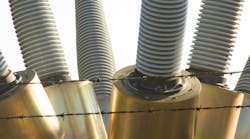Anterix will participate in a broad alliance among energy industry leaders that are supporting the U.S. Department of Energy's (DOE's) national laboratories' efforts to help modernize the energy grid.
The company is joining Idaho National Laboratories, the National Renewable Energy Laboratory, Oak Ridge National Laboratory, the Pacific Northwest National Laboratory (PNNL), ABB, Amazon, Avista Utilities, EPRI, the National Rural Electric Cooperative Association, Nokia, and Survalent to support the Assessment of Communication Architectures for Energy Systems (ACAES).
ACAES is one of nine projects, led by national laboratories and public- and private-sector entities, that are components of the DOE's 2023 Grid Modernization Initiative (GMI), announced in September 2023. GMI represents a $39-million investment in projects that will support the development and deployment of concepts, tools and technologies needed to measure, analyze, predict, protect and control the grid of the future while incorporating equity and the best available climate science.
The ACAES team, led by PNNL, is conducting analysis to identify and suggest ways to mitigate gaps in technology, standards, and processes for communications across the grid. The team will also create a large library of potential cyber-attack scenarios, including their operational consequences, to support and advance future cybersecurity training and planning.
Lastly, the ACAES team will use this information to provide recommendations for new and improved technology, standards, and practices to address potential risks and help ensure that a grid with high distributed energy resources penetration is secure.
"Today's announcement demonstrates Anterix's deep commitment to—and our expertise in—helping our utility customers keep the grid secure," said Rob Schwartz, President & CEO of Anterix. "High-speed, high-capacity, secure grid communications are more vital than ever as threats to the energy grid increase. I am proud that Anterix, in conjunction with our six customers driving 900 MHz private wireless broadband across 15 states, combined with our Security Collective and our broader Ecosystem, are pursuing solutions to make the grid more secure and more advanced. Projects like ACAES will be vital to utilities' efforts to keep the grid secure."
"Electrification and high penetration of distributed energy resources (DERs) and EVs, properly planned and coordinated in a secure grid architecture, will bring important benefits in sustainability, equity, reliability, and resilience to the utility industry. Grid communications systems will be key to realizing that future," said Jim Ogle, Chief Energy Systems Engineer in PNNL's Electricity Infrastructure Group. "With expert input from industry advisors, the ACAES project will help define secure architectures for the critical grid communications systems upon which the modern grid will depend."
"DERs introduce a variety of changes to the grid and associated communications systems. These include new telecommunications technologies, inclusion of behind-the-meter resources, and an increased role of third-party aggregators in both bulk and distribution system operations," said Ben Ealey, EPRI Technical Lead of DER Data and Connectivity. "Projects like ACAES are beneficial to helping the energy sector understand the changes each introduces and how best to maintain grid security, as part of a reliable, affordable, and equitable clean energy future," he added.


